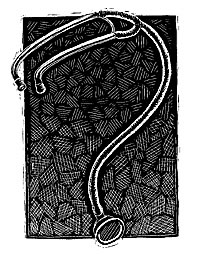Grand Rounds
Heavy duty By Mary Margaret Andrews, M.D.
Like it or not, most physicians have bought in to the concept that long resident duty hours are a rite of passage synonymous with a strong work ethic and sense of professionalism. I was a schoolgirl when the New York Times Magazine ran a feature about the arduous life of resident doctors. I took the magazine up to my bedroom, closed the door, and lay on the floor, fully absorbed in the fantasy of hospital life. To this day, I can see the photographs of the '60s-era dark-rimmed glasses on a young doctor with rumpled hair and tired eyes bending over a patient's chart. He'd no doubt been working for 30 hours straight. I didn't know it then, but I had already formed a value judgment about physician duty hours by admiring the sleep-deprived resident in the article. These judgments are proving hard to undo.

|
|
Is it arrogance or fear of change that keeps physicians adhering
to the belief that long duty hours must be part of medicine? |
Quirk: In fact, they are proving so ingrained in the graduate medical education culture that we forget it may be "a curious quirk of history and personality," as Massachusetts General Hospital medical resident Siddhartha Mukherjee, M.D., recently argued in The New Republic. There, he recounted the frenetic history of William Halsted, a cocaine-fired Baltimore surgeon. Halsted set the pace for generations to come—"exertion to the point of collapse." When Medicare was enacted in the 1960s, that pace was a setup for abuse in dollar-poor university hospitals looking for an inexpensive physician labor force— which they found in residents. Such is the making of history. The educational value of residents working long hours and observing the evolution of a patient's disease process appears to have been a fortuitous by-product of this system. Similarly, patient "ownership," a willingness to take responsibility for patients and see problems to completion, is an artifact rather than a requirement of long duty hours— 100-plus hours per week in many instances.
Effective July 1, 2003, this era in medical training ends with the implementation of mandatory reductions in resident-physician work hours. The new rules set an 80-hour-per-week maximum, with one day out of every seven free from work, a minimum of 10 hours off between shifts, and a maximum of six hours that a resident can stay to complete and hand off work following a 24-hour admitting period. These work-hour restrictions, which were prompted by new rules from the Accreditation Council for Graduate Medical Education, follow growing documentation regarding the pitfalls of sleep deprivation and medical errors.
To all involved—except the affected residents—it is easy to see why duty-hour reform has not come sooner or more easily. In our hospital, like in many others, residents have typically provided all the inhouse, overnight coverage. These new rules resulted in complex scheduling challenges, like moving pieces on a chessboard, with a checkmate at every turn. Replacing that residentphysician coverage with more senior provider coverage will come at a tremendous dollar cost, estimated to be a minimum of three times the amount of paying one resident. Similarly, innovative and labor- intensive methods will now be required to document and track residents' work hours.
Challenges: Despite these various logistical and fi- nancial challenges, our greatest challenge is changing the physician culture. Around DHMC these days, discussions about duty hours reveal a great deal of raw emotion from both resident and attending physicians. Many attendings openly scorn moving toward "shift work" and talk repeatedly about the experience they survived to become professional and capable clinicians (as if this was the only possible route to that outcome). Many express outright anger about regulatory evils. And almost all are anxious about how their work schedules may be impacted. Surprisingly, even residents who are already immersed in the night-call culture are finding it hard to think of creative ways to hand off patient responsibilities post-call. All these concerns are understandable and require study.
Have the new regulations gone far enough? Unfortunately, I don't think so. Working 80 hours a week may be possible for short periods of time, but over the long haul it wears on one's body and psyche. There is a price to pay: The adrenaline-fueled, out-of-body feeling. The extraordinary concentration required to hear and then relate a patient story or to remain pleasant to a colleague or to a patient's family member. The sheer number of calories needed to stay awake that many hours—the reason for countless tales about scavenging for food (especially unhealthy food) while on-call. But the good news for the future is that someone has finally noticed.
Effects: As several recent articles in the New England Journal of Medicine have noted, the data on the deleterious effects of sleep deprivation is clear in the transportation and nuclear power industries. Is it arrogance or fear of change that keeps physicians adhering to the belief that long duty hours must be part of medicine? Or is it the economic impact that the health-care industry will now be forced to confront? In any case, we must accept the fact that medical education is not static. We must take steps to reduce duty hours even further below the new 80-hour requirement. To all non-believers, I recommend staying up all night, two or three nights a week, for the next few years to remind yourself of how it feels. For the safety of patients and the health of medicine, we must embrace these new rules now. �
"Grand Rounds" covers a topic of interest to the Dartmouth medical faculty. Andrews, an assistant professor of medicine (infectious disease), also did her residency in internal medicine and a fellowship in infectious disease at Dartmouth-Hitchcock.
If you would like to offer any feedback about this article, we would welcome getting your comments at DartMed@Dartmouth.edu.
